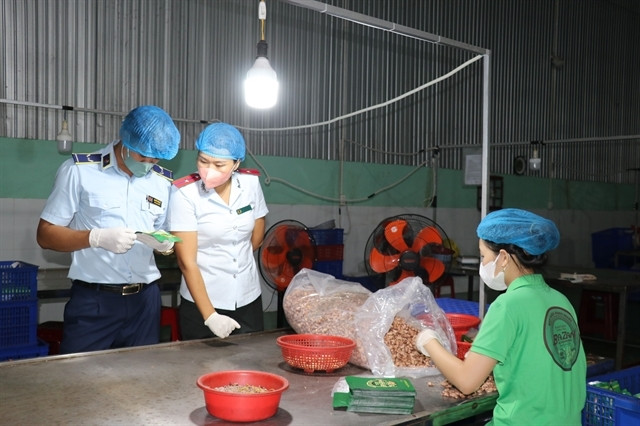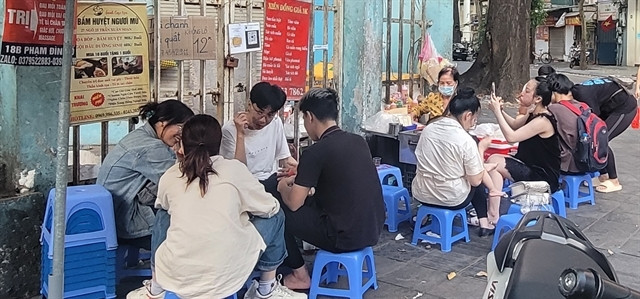 |
| Inspectors check food safety and hygiene in Bình Phước southern province. — VNA/VNS Photo Nhật Bình |
Worries
In early May this year, Long Khánh City in Đồng Nai Province recorded a food poisoning case that caused more than 500 people to be hospitalised after eating breads with meat bought from a small business.
On average, every day, the enterprise sold around a thousand of this type of bread, with all ingredients processed at its kitchen.
After the incident, the provincial authorities inspected the producer and found that it had neither a business licence or a certificate to show it had met food safety conditions.
Of the four employees working there, none of them had any periodic health examination certificate or any certificate in food safety training.
More recently, on May 15, Đồng Nai Province recorded a suspected food poisoning case in which nearly 100 workers of the De Chang Việt Nam Co Ltd in the Giang Điền Industrial Zone in Trảng Bom District had to be hospitalised, sick with abdominal pain, dizziness, nausea and vomiting.
Previously, nearly 150 workers of the Starite International Việt Nam Co Ltd in the Bàu Xéo Industrial Zone suffered from food poisoning after having lunch in the company canteen.
In Sóc Trăng Province, 150 people were taken to hospital with food poisoning in January after visiting a bread shop.
Another case occurred in Khánh Hòa Province in March, with 369 people rushed to hospital. Later food tests showed that what they had eaten was contaminated with microorganisms.
Difficult work
Over recent years although the authorities have strengthened inspections and supervisions, food poisoning in bigger kitchens is actually increasing.
In the first five months of this year, the country had 36 food poisoning cases, down on the same period last year, but the number of those falling ill increased, to more than a thousand, according to the Ministry of Health (MoH).
Bringing down the number of cases of food poisoning cases, especially in industrial zones, is still a challenge for the authorities.
Local leaders said that currently, food production and trading enterprises were managed by the health, industry and trade and agriculture sectors. However, the number of inspectors in charge of the three sectors are very limited.
Management
 |
| People eat street food in Hai Bà Trưng District in Hà Nội. — VNA/VNS Photo Phương Anh |
In a national online conference on food safety and hygiene, which was held on Tuesday by the MoH, Deputy Minister of Health Đỗ Xuân Tuyên stressed that ensuring food safety was important, because it not only directly affected people's health but also affected security, order and socio-economic activity.
He said: "We should make efforts to minimise the number of food poisoning cases and see them occur on a smaller scale, with the fewest infected people and have the least impact on people's health, social security and economic development."
He said that the Party Central Committee’s Secretariat has issued the Directive 17 on strengthening security and food safety and that the Government is continuously reviewing its policies on food hygiene.
In addition, the Law on Food Safety Law, Decree 15 guiding the implementation of the law, guiding documents issued by the MoH, Ministry of Industry and Trade, and the Ministry of Agriculture and Rural Development, and other regulatory documents, have controls on food safety.
But Tuyên suggested that new laws and policies need to be amended or brought in to counter the current problems.
“How can controls be implemented at the facility? When the authorities inspect many establishments which do not have certificates of food hygiene and safety,” he wondered.
Nguyễn Hùng Long, Deputy Director of the Việt Nam Food Safety Authority (VFA) under the MoH, said that scrutiny of small food stalls was not strict enough.
The legal documents on ensuring food safety and preventing food poisoning are basically complete, however inspection and supervision levels are lacking, especially at the grassroots level.
The MoH requested provinces and cities to be resolute in suspending operations of establishments that do not ensure food safety conditions or do not have certificates of food safety eligibility.
Bread stores were food processing establishments, so they must register that as their trade and their employees must have regular health checks and full training to limit the risk of food poisoning, said Long.
Violations need to be made public and widely publicised.
In addition, the MoH demanded that health facilities are ready to treat, investigate and handle any mass food poisoning cases, as efficiently and quickly as possible.
The health sector needs to urge people to immediately go and get emergency treatment as soon as they experience food poisoning.
Deputy Chairman of the Đồng Nai People's Committee Nguyễn Sơn Hùng directed relevant departments and localities to immediately check ready-made meal processing facilities and collective kitchens in industrial parks, schools, food service establishments, street food and bottled drinking water establishments.
Hùng also requested that the provincial Department of Health set up a hotline to offer information on food safety and hygiene.
In Hà Nội alone, there are currently more than 5,000 industrial-sized kitchens in parks, schools and agencies.
To minimise the chance of mass food poisoning, in addition to a greater focus on inspections, the municipal Department of Food Safety and Hygiene instructed those in charge to understand how to check on food freshness, how to preserve food and how to check the origin and expiration date of food on the labels.
The department also asked the kitchens to only choose reputable food suppliers.
Director of the Hà Nội Department of Food Safety and Hygiene Đặng Thanh Phong said that the number of inspections would increase and more checks would be made on where the food comes from, and how, and where, it is packaged and prepared. — VNS